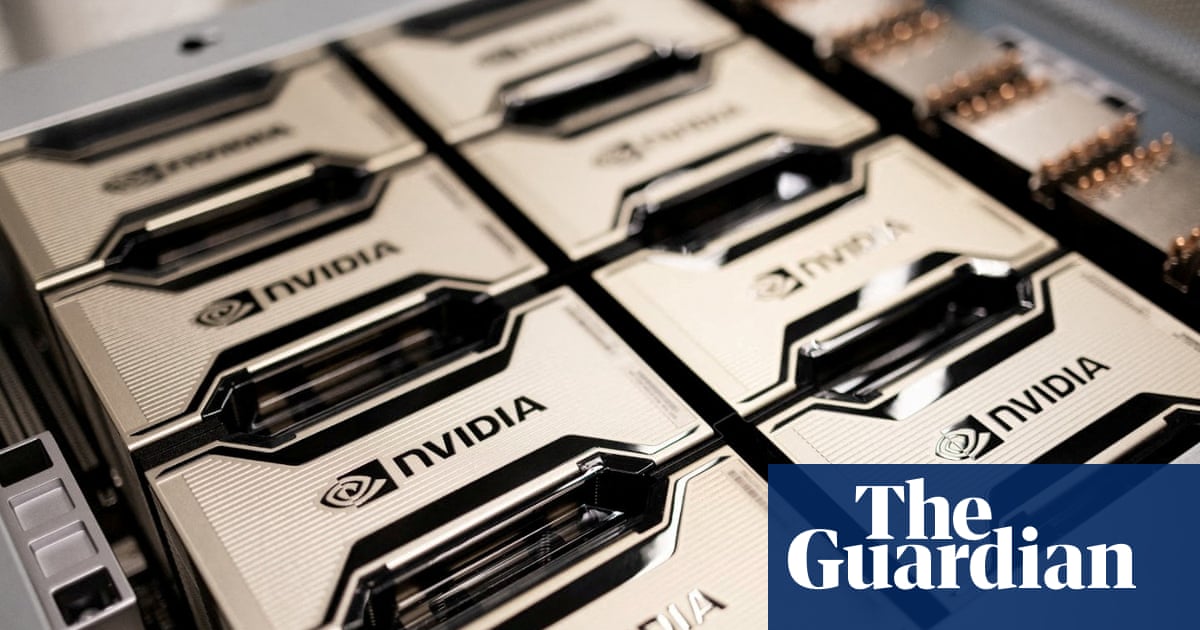
Investors are sending mixed signals regarding their appetite for tech stocks, as the growing debate over the artificial intelligence boom, and a US clampdown on chip exports to China, raise questions over the direction of growth for key companies.
There were fears of a fresh sell-off after the US-listed shares in the chip maker Nvidia dropped 7% overnight, amid concerns that excitement over companies at the forefront of AI development had been overblown.
Nvidia, which has been the biggest beneficiary of the AI boom, has now fallen by 20% from last month’s peak. The semiconductor designer Arm, which has also benefited from the AI hype, ended the session down 6%.
Shares in Microsoft were down almost 3% in after-hours trading, after it revealed that growth at its cloud division, Azure, had slowed as it struggled to keep up with AI-related demands.
The company also said later that a service outage on Tuesday that affected some of its apps and features was sparked by an attempted cyber-attack. This caused performance problems on parts of the Azure platform, it added.
Dan Coatsworth, an investment analyst at the broker and investment platform AJ Bell, said: “Euphoria around AI is now at risk of spluttering if more people ask when companies are going to generate positive returns from the significant investments made to support artificial intelligence technology. It’s no longer good enough to simply say AI will be deployed.
“There is a fear that companies might take their foot off the pedal in terms of AI investments if there is more focus on the financial returns, meaning the AI enablers like Nvidia and Microsoft might lose the tailwind that has sent them to the moon in recent years.
“That hasn’t happened yet, but it feels like the narrative is beginning to shift in the market. Just remember that the stock market is forward-looking and investors are pricing in what they think will happen next, not what is happening now or recently.”
However, shares in the Korean tech manufacturer Samsung rose almost 5% after it recorded strong earnings thanks to high demand for its AI chips. Its earnings rose fifteenfold in the second quarter compared with last year to 10.4tn won (£5.8bn), up from 670bn won a year earlier.
The company, which is the world’s largest manufacturer of smartphones, televisions and memory chips, remained bullish about AI demand, saying that AI servers were expected to take up a larger portion of the memory market in the second half of the year as major cloud service providers and enterprises expanded their investments in the technology.
The Dutch chipmaker ASML also made gains of almost 6% on Wednesday, amid reports that it would be exempt from the Biden administration’s plans to halt exports of chipmaker equipment from some foreign countries to China.
Reuters reported that allied countries including Japan, the Netherlands and South Korea would be excluded from the new powers, due to be rolled out next month. The new rules have been prompted by US fears that China could get its hands on advanced technology that could be deployed by its military.
Meanwhile, the British silicon wafer manufacturer IQE rose 9% on Wednesday morning after saying it would list its Taiwan subsidiary on the country’s stock exchange.
IQE, which was valued at £284m at yesterday’s close, will sell a minority shareholding in the initial public offering but it intends to retain control of the subsidiary, IQE Taiwan.












